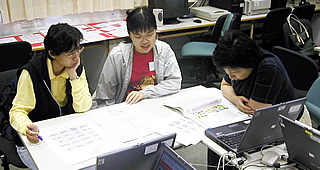| 2. |
Note: |
These activities have
been covered in greater depth in Postcards 1 and Postcards 2.
It may be useful to read the steps in these activities if your students
have not completed them earlier.
|
| 3. |
Key: |
 |
ride |
rode |
 |
see |
saw |
 |
try |
tried |
 |
go |
went
|
|
| 4. |
Note: |
If you think your students will find it
difficult to think of ideas, it may be a good idea to first complete the PrimeTeach
package Visiting Hong Kong where students are introduced to a
number of places to visit and things to do in Hong Kong.
|
| 5. |
Theory: |
This is a way of helping students to brainstorm
ideas. Write brief notes of the students' ideas in a random order on a
large piece of paper. Since there is no need to give the ideas in a
logical sequence or categorise them in any way, students are freed from
worrying about the order of ideas or where to put them. The students'
ideas can also be written on the board but a sheet of paper is often used
and displayed on a notice board, thus freeing up board space for sentence
writing etc.
|
| 6. |
Example: |
|
Things to do |
|
Things to see |
|
Things to eat |
 |
go to Ocean Park |
 |
the Big Buddha on Lantau |
 |
congee |
 |
ride on the Peak Tram |
 |
fishing boats in Aberdeen
harbour |
 |
dim sum |
 |
watch birds at Mai Po
Wetlands
|
 |
statues in Kowloon Park |
 |
fried rice |
|
| 7. |
Example: |
 |
Dear Cousin, |
 |
Best wishes from, |
 |
Dear __(name)__, |
 |
Lots of love from, |
 |
Greetings from __(country)__! |
 |
Love from, |
 |
Hi __(name)___! |
 |
See you soon,
|
|
| 8. |
Example: |
Greetings from Hong
Kong!
I am staying with my cousin. We have had a lovely time!
Yesterday we went to Lantau. We saw the Big Buddha statue and drank tea in
the tea gardens. I ate in the floating restaurant in Aberdeen. I tried Dim
Sum and loved it!
Looking forward to coming home soon,
Chris
|
| 9. |
Theory: |
It is
important to monitor students in order to gather information about
their ability to use language skills. The teacher can note students'
strengths and weaknesses. This data is part of formative assessment which
informs future teaching and learning. Monitoring helps to identify
problems that need to be dealt with on an individual basis. It also
enables the teacher to make a note of problems that are common to many
students. These problems can then be focused on during whole-class
feedback.
|
| 9. |
Note: |
It is easier to make comments and see errors in
someone else's work than in one's own. Also, this kind of peer support
gives students confidence
and a feeling of independence when they are writing.
|
| 10. |
Theory: |
This is an important stage in the
writing process. During this stage, students will be editing and
proofreading their work. Editing means making changes to content.
Proofreading means looking for errors of accuracy. Both are important
stages that effective writers may go through several times before they
feel their work is finished.
|
| 11. |
Theory: |
Give
students a feeling of pride and satisfaction in what they have achieved in
English by displaying their work in the classroom or in other places in
the school. This will enhance students' motivation to learn English.
|

